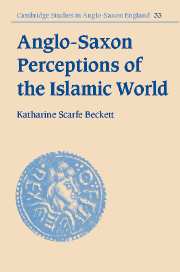Book contents
- Frontmatter
- Contents
- Acknowledgements
- List of abbreviations
- 1 Introduction
- 2 Islam during the Anglo-Saxon period
- 3 Anglo-Saxon contacts with Islam
- 4 Arabs and Arabia in Latin
- 5 Ismaelites and Saracens in Latin
- 6 Arabs, Ismaelites and Saracens in early Anglo-Latin
- 7 Pseudo-Methodius and the sons of Ismael
- 8 Arabs, Ismaelites and Saracens in Old English
- 9 Persisting theories about Saracens in post-Conquest England
- 10 Conclusions
- Bibliography
- Index
7 - Pseudo-Methodius and the sons of Ismael
Published online by Cambridge University Press: 22 September 2009
- Frontmatter
- Contents
- Acknowledgements
- List of abbreviations
- 1 Introduction
- 2 Islam during the Anglo-Saxon period
- 3 Anglo-Saxon contacts with Islam
- 4 Arabs and Arabia in Latin
- 5 Ismaelites and Saracens in Latin
- 6 Arabs, Ismaelites and Saracens in early Anglo-Latin
- 7 Pseudo-Methodius and the sons of Ismael
- 8 Arabs, Ismaelites and Saracens in Old English
- 9 Persisting theories about Saracens in post-Conquest England
- 10 Conclusions
- Bibliography
- Index
Summary
Three manuscripts from the end of the Anglo-Saxon period contain versions of the work known as the Reuelationes of pseudo-Methodius. Salisbury, Cathedral Library, 165, 11r–20v, contains a copy of an early and lengthy recension. Another, later recension, constituting an abbreviation of the earlier text, is represented in London, British Library, Royal 5.F.xvii, 29v–32v. A recent study of Salisbury manuscripts indicates that the folios of Royal 5.F.xviii which contain Reuel.2 date from the late eleventh century and were copied in Salisbury at about the same time as the copy of Reuel.1 contained in Salisbury 165. Another example of Reuel.2 known in Anglo-Saxon England is found in Oxford, Bodleian Library, Bodley 163 (Bodley 163). The text is contained in part of the manuscript which probably dates from the late eleventh century.
The ultimate source of the Reuelationes was composed in Syriac in the seventh century, and purported to be an account by an early fourth-century bishop, Methodius of Olympus, of the ages of the world and the succession of earthly kingdoms up until the Day of Judgement. The Syriac original was in fact most probably composed in northern Mesopotamia more than three hundred years later, during the second half of the seventh century, and its author is therefore referred to as pseudo-Methodius. The Apocalypse of pseudo-Methodius, as his work is often known, proved popular and gave rise to multiple Greek, Latin and vernacular translations and revisions.
- Type
- Chapter
- Information
- Anglo-Saxon Perceptions of the Islamic World , pp. 140 - 164Publisher: Cambridge University PressPrint publication year: 2003



